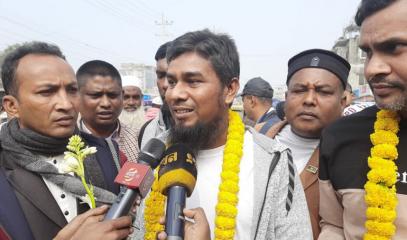Govt releases 127 members of the Bangladesh Rifles involved in the Pilkhana massacre
People jailed for explosive possession were released on bail. After 16 years in prison, many accuse former Prime Minister Hasina and her government of unjustly jailing them. Children are anxious to see their imprisoned fathers. Many now demand a review of the original investigation.
Dhaka (AsiaNews) – Bangladeshi authorities have ordered the release on bail of 127 former members of the Bangladesh Rifles (BDR), now called Border Guard Bangladesh (BGB), who will be able to leave the Kashimpur Central Jail in Gazipur, a city in Dhaka Division.
The men were jailed for possession of explosives and involvement in Pilkhana massacre of 2009, when a mutiny by border guards left dozens of people dead, including scores of army officers.
The release of more than a hundred prisoners after years behind bars was a moment of celebration for their families.
Yesterday morning, at 11 am, 16-year-old Tahsin Akhter was standing in front of the main gate of Kashimpur Jail holding flowers. Her eyes and face were full of excitement at the idea of hugging a father seen only during prison visits who was now finally free.
Mohammad Dulal Mia, a former BDR member of the Bangladesh Rifles, was finally able to leave his cell and hug relatives after a 16-year wait. When Tahsin was only eight months old, her father was arrested in connection with the guards mutiny in Pilkhana.
Struggling to contain her joy, Tahsin, who is now in the tenth grade, talked about her childhood saying that she has no "memories" of being with his father. “Today I am very happy because my father has been released. We are grateful to the provisional government" of interim Prime Minister Mohammed Yunus,” she said.
While praise is heaped on the new government, there is also no shortage of criticism for former Prime Minister Sheikh Hasina, now in exile in India after street protest last August led to her ouster.
Like Tahsin, relatives of other soldiers gathered in front of Dhaka Central Jail since morning, following reports that jailed former BDR members would be released. Most were carrying bouquets of flowers.
The arrests and convictions are linked to one of the most tragic pages in Bangladesh's recent history.
On 25 and 26 February 2009, at least 74 people, including 57 army officers, were killed in a mutiny at the BDR headquarters in Pilkhana, Dhaka. Those accused were charged with and tried for murder and possession of explosives.
Following the incident, the unit’s name was changed from Bangladesh Rifles (BDR) to Border Guard Bangladesh (BGB).
Some BDR members were acquitted and released or served their sentence for murder, but 468 were held for explosives possession.
The trial of 850 people for murder ended on 5 November 2013 with 152 death sentences by hanging, and 160 of life imprisonment, plus another 256 on various prison terms. Some 278 people were acquitted.
After the fall of the Hasina government, a chorus of voices demanded a review of the facts and a new investigation to shed real light on the Pilkhana massacre.
Sepoy Abu Hasan, a member of the Dhaka Sadar Battalion, was one of those who benefitted from the release. “When the BDR mutiny took place, I had six months of service," he said, adding forcefully that the charges were baseless.
Maliha Jannatun was one of the many youths waiting early this morning for the release of her father, Munsur Ali, at the main entrance of Dhaka Jail. When Munsur, who hails from Haripur in Thakurgaon district, ended up in prison, she was only three months old.
She is now in grade 10 at the Ranhatra Chauhaddi High School. "We are very happy that my father was released after 16 years. Now he will live in the open air" and “we will all go for a walk".
Sepoy Enamul of the 45th Battalion in Mymensingh, was also released on bail. For him, "Hasina's fascist government imprisoned us on false grounds. We demand that all those who are innocent be reinstated in their jobs. The real criminals in this incident should be identified and punished.”
17/11/2022 11:50








.png)










